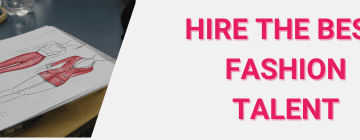In the fast-paced fashion industry, technical skills are crucial, but soft skills can be equally important for long-term success. This blog will delve into the essential soft skills that fashion recruiters should prioritize when evaluating candidates and provide examples of how these skills can contribute to a thriving workplace.
Understanding the Essential Soft Skills
Communication Skills
Effective Communication: Effective communication is key in the fashion industry, where collaboration between designers, marketers, and production teams is essential. Recruiters should look for candidates who can articulate their ideas clearly and work well with others.
Example: A successful fashion buyer must communicate effectively with suppliers and internal teams to ensure that collections meet market demands and brand standards.
Creativity and Innovation
Thinking Outside the Box: The fashion industry thrives on creativity and innovation. Candidates who can think outside the box and bring fresh ideas to the table are invaluable. Recruiters should assess a candidate’s ability to innovate and adapt to new trends.
Example: Creative directors who can consistently come up with groundbreaking concepts and adapt to the ever-changing fashion landscape help keep brands at the forefront of the industry.
Problem-Solving Abilities
Handling Challenges: Fashion professionals often face unexpected challenges, from supply chain disruptions to last-minute design changes. Recruiters should seek candidates who demonstrate strong problem-solving skills and the ability to stay calm under pressure.
Example: Production managers who can quickly resolve manufacturing issues ensure that deadlines are met and quality standards are maintained.
Teamwork and Collaboration
Working Together: Fashion projects are rarely solo endeavors. The ability to work effectively as part of a team is crucial. Recruiters should prioritize candidates who have a proven track record of successful collaboration.
Example: Design teams that work cohesively can more effectively bring a collection from concept to runway, ensuring all elements are seamlessly integrated.
Adaptability and Flexibility
Embracing Change: The fashion industry is dynamic, with trends and consumer preferences constantly evolving. Recruiters should look for candidates who are adaptable and open to change.
Example: Marketing managers who can quickly pivot strategies in response to market trends help brands stay relevant and competitive.


